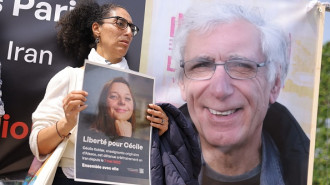Lebanese minister wants to open sea crossings to allow Syrian refugees to leave for Europe
Lebanese caretaker Minister of the Displaced Issam Sharafeddine has called for the opening of Lebanon's maritime borders to allow Syrian refugees to "safely" leave Lebanon for Europe.
His comments, which were made in a televised interview on Friday, came as Lebanon struggles to cope with the high number of refugees it hosts.
The comments also came as rights groups note an increase in arbitrary arrests, torture and forcible return of Syrian refugees from Lebanon in recent months amid heightened anti-refugee sentiment in the country.
"There are known international obstacles in the refugee file," Sharafeddine told MTV channel, alluding to the European Union (EU) maintaining that refugees cannot be returned to Syria except if their return was "safe, voluntary and dignified".
"We, as a ministry, have a deportation plan for refugees," he said, adding that he would push for the opening maritime borders "widely to serve as a means of pressure to return Syrian refugees to their country".
While Lebanese politicians are pushing back on EU calls to assist migrants and refugees from Syria, the army commander, Joseph Aoun, remains committed to preventing illegal sea migration because it's prohibited by international law, local media reported.
Sharafeddine's comments came just a day after an Human Rights Watch (HRW) report said that Lebanese Armed Forces [LAF] had forcibly returned Syrians to Syria, including an army defector and an opposition activist.
The rights watchdog said that Syrian refugees were trying desperately to remain in Lebanon despite deportation orders and an increasingly hostile environment exacerbated by officials' scapegoating of the refugee population.
Syrians who are forcibly returned to Syria face arrest, torture, and execution at the hands of President Bashar al-Assad's regime, rights groups have warned, as well as forcible conscription into the regime's army.
"Lebanese officials have for years imposed discriminatory practices against Syrians in the country as a way of coercing them to return to Syria, which remains unsafe," said Ramzi Kaiss, Lebanon researcher at HRW.
"Arbitrarily arresting, torturing, or deporting Syrians who face a well-founded risk of persecution if returned are additional blights on Lebanon’s refugee record."
In March, a United Nations (UN) report indicated that the UN High Commissioner for Refugees (UNHCR) was aware of "13,772 individuals deported from Lebanon or pushed back at the border with the Syrian Arab Republic in approximately 300 incidents in 2023", including 600 people in one day on 8 November.
It further said that "local authorities in 27 municipalities took measures limiting the ability of Syrian refugees displaced in south Lebanon from finding alternative shelter".
The reference was in relation to the displacement of tens of thousands of residents in South Lebanon following the cross-border hostilities between Israel and Lebanese and Palestinian armed groups that have been ongoing since October 2023.
Since the killing of a local political party official on 7 April, which the Lebanese army alleged was carried out by a group of Syrian nationals, Lebanese ministers and political officials have made calls for the return of Syrians in Lebanon, fuelling ongoing violence against Syrians.
In April, Syrians in Lebanon were reportedly beaten and faced pressureto leave their homes, with governorates and municipalities imposing discriminatory curfews, unlawfully restricting Syrians’ right to freedom of movement.
According to UNHCR, Lebanon has the largest number of refugees per capita and per square kilometre in the world, with the Lebanese government estimating that there were 1.5 million Syrian refugees in the country.
The country is also grappling with the worst economic and financial crisis in its modern history - one that the World Bank has said was likely to rank as one of the worst the world has seen in the past 150 years.





 Follow the Middle East's top stories in English at The New Arab on Google News
Follow the Middle East's top stories in English at The New Arab on Google News

![The law could be enforced against teachers without prior notice [Getty]](/sites/default/files/styles/image_330x185/public/2178740715.jpeg?h=a5f2f23a&itok=xMdFOAIF)
